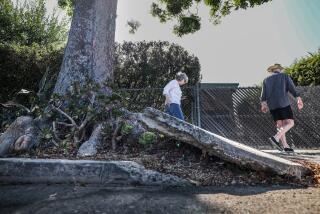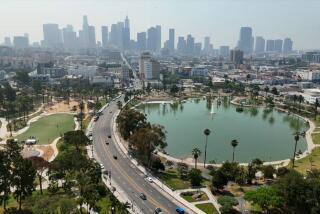Op-Ed: L.A. spent 10 years and $20 million to redesign one street. Here’s what we got

On Aug. 30, 2018, Los Angeles officially completed renovations on 4.5 miles of streets along the Figueroa corridor. The project took 10 years and cost $20 million. What did we get for all that effort?
THE GOOD
- New sections of protected bike lanes along Figueroa Street keep cyclists segregated from vehicle traffic — making portions of the street far safer and more pleasant for riders than traditional striped lanes.
- An exclusive bus lane on Figueroa helps buses speed past traffic and stay on schedule, even during rush hour. Additionally, new, raised bus stop platforms provide riders with shelter from the elements, better lighting and signage, and allow more efficient rider pick-up and drop-off.
Read More: MyFigueroa is everything wrong with L.A.’s alternative transit efforts »
THE BAD
- Despite MyFig’s improvements, its design still makes too many concessions to cars. Newly installed bicycle stoplights are intended to protect riders from right-turning cars. Instead, they force riders to slow or stop entirely while cars and pedestrians are free to proceed. Right-turning cars are also given a pass to ride in bus-only lanes, delaying hundreds of transit riders during heavy traffic. The obvious solution would be to synchronize the bike stoplights with pedestrian crossing signals and to restrict cars from turning right at more intersections.
- New bike and bus lanes are great in theory, but they’re useless in practice when ride-share drivers, police, delivery drivers and construction workers use them as parking lots.
THE UGLY
- The intersection of 7th Street and Figueroa threatens to override all the positive gains made elsewhere. Cars routinely make illegal right turns from the bus-only lane, endangering cyclists and pedestrians and grinding bus traffic to a halt. The busy raised platform that connects bus riders to the 7th and Metro subway station only has space for one bus at a time. The city could easily relieve the congestion by removing a restaurant valet stand and extending the platform.
- MyFig’s smartest infrastructure improvements are sporadic and poorly regulated by law enforcement. Protected bike lanes exist for only a block or two at a stretch, so bicyclists can’t count on their safety. Bus-only lanes are clogged with cars, so riders can’t count on arriving at their stops on time. Pedestrians can’t count on cars not ignoring the rules and illegally plowing through a crosswalk. And the project arbitrarily cuts off at Wilshire, leaving anyone who has to keep traveling north on Figueroa stuck in the same dangerous mess they were in before the city spent $20 million in upgrades.
Follow the Opinion section on Twitter @latimesopinionand Facebook
More to Read
A cure for the common opinion
Get thought-provoking perspectives with our weekly newsletter.
You may occasionally receive promotional content from the Los Angeles Times.











